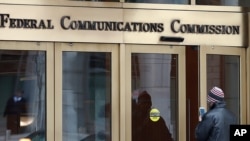Officials in Washington are nearing a decision on whether to bar four Chinese state-backed telecommunication companies from operating in the United States.
A U.S. Senate subcommittee this week released a report urging the Federal Communications Commission (FCC) to quickly decide whether to revoke authorizations for several Chinese telecom firms that have links to China’s government.
The report was based on recommendations from “Team Telecom,” an informal group comprised of officials from the Justice, Homeland Security, and Defense Departments, who urged the FCC to complete its review of the licensing of China Telecom and other Chinese companies in the U.S. as soon as possible.
Critics say the companies, including China Telecom Americas, China Unicom Americas, Pacific Networks and its subsidiary ComNet USA — which operate in the United States but are either owned or effectively controlled by the Chinese government — pose national security risks. This fits with the U.S. government’s growing scrutiny of foreign telecommunication operators within its borders.
The Department of Justice made the recommendation on April 9. It noted there are "substantial and unacceptable national security and law enforcement risks" associated with China Telecom’s operations, and the FCC should revoke and terminate China Telecom Americas' license.
Legal experts said it would be difficult for the companies to provide sufficient evidence to retain the licenses, in part because the fact that they are state-owned is unlikely to change.
Experts see coordinated U.S. push
Joel L. Thayer, an attorney specializing in telecommunications, regulatory and transaction matters, told VOA, “It does seem that there is a coordinated effort from both the Trump administration and now the FCC, which is an independent agency, to combat what they feel is a threat to our U.S. networks.”
He said he was quite surprised that it took the FCC so long to act on the Chinese telecom firms.
Martijn Rasser, Senior Fellow, Technology and National Security Program at the Center for a New American Security, said if Team Telecom “discerned that or concluded that these Chinese companies had presented an unacceptable national security risk, then it could revoke the licenses outright.”
Rasser said: “There's very strong bipartisan agreements on these issues. I don't see any change along these lines happening any time soon. Just because they are both Republicans and Democrats very much aligned in their views on the threat.”
China Telecom Americas urged the FCC late Monday not to revoke the company’s license to operate in the U.S., saying it had cooperated with U.S. law enforcement agencies and national security agencies in their investigations.
It called the government’s claims “unfounded,” and said the FCC should not revoke its right to operate in the United States “based solely on foreign policy concerns in the absence of any evidence whatsoever of specific misconduct.”
China Unicom Americas in a June 1 FCC filing said it had “a two-decade track record as a valuable contributor to U.S. telecommunications markets, a good record of compliance with its FCC regulatory obligations, and a demonstrated willingness to cooperate with U.S. law enforcement agencies.”
The filings are in response to the FCC's April 24 "Order to Show Cause" issued to the telecommunications companies. The orders asked them to explain why the commission should not start the process of revoking their domestic and international section authorizations enabling them to operate in the United States.
There is a precedent for the FCC to reject license applications from Chinese companies. In May 2019, the FCC rejected China Mobile's application for an international business license in the U.S.
Adrianna Zhang contributed to this report.






